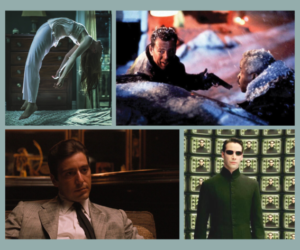I like breaking things down in categories, in order to look at them in a more structured way. Of course, that’s not the final objective – the charm of films is often how they combine different ideas, themes and contexts in order to obtain something special. However, it’s still a fun exercise to see what sort of material they tapped into in order to construct their premise, their environment and their plot. Consequently, this article will tap into such a categorisation, but for sci-fi films in particular. Keep in mind, oftentimes, these main themes will interact, although you will seldom see more than two combining within one movie. This is because some sort of focus needs to be preserved in order to retain some sort of familiarity – otherwise, it might be a little bit too chaotic.
1. Aliens
I went for aliens first as the classic sci-fi film. There are so many variations across this sub-genre, that it has been enough to keep it fresh and interesting across the decades. One major category is the alien invasion film, as popularised by H.G. Wells’ book, War of the Worlds. Earth usually suffers an alien invasion, which most often starts after a brief snapshot of normal life. This could be more of a survival film, an action film or a horror film. You also have the fascinating ‘visit but non-invasion’ scenario, where aliens coexist with humans in different ways – a good example would be District 9. Of course, you also have the hidden coexistence, as well as the spy/government conspiracy sort of thing – anything that took Roswell as a source of inspiration, such as for instance X-Files. And I am going to make a separate category for the excellent Arrival, which takes a more nuanced approach to alien-human interaction and communication. Lastly, a major category of alien films are the… Alien films. These usually occur on space stations or faraway planets, and revolve more around the horror elements of the genre.
2. Space exploration/colonisation
Sometimes, this category intersects with the previous one, with alien interaction being the biproduct of space exploration. Series such as Star Trek and Stargate, or even the much loved Star Wars films could fall into this category. They are usually set in a distant future, when technology has evolved so much that it permits faster than light travel speed, and consequently, the possibility of deep space exploration. Star Wars in particular doesn’t root itself in evolution of present technology, but instead opts for a very different context and environment, with nothing revolving around Earth or the human race as we know it. However, films in this sub-category could also take an alienless approach and just feature humans in space – in which case, we could perhaps be looking at Gravity or Moon – projects that are a little bit more feasible to imagine with current levels of technology.
3. Time travel and/or alternate dimensions
Time travel comes under many different forms, with some films taking a more complex sci-fi approach (Primer is a prime example of this), others going for a less tech-reliant pathway (Dark, The Terminator and even The Prestige could make the cut here), and others snubbing the concern altogether and basing in in their pre-existing fantasy/paranormal context (The Man in the High Castle, which also deals with another deviation of this sub-category, that of alternate history within parallel dimensions). Stuff like Back to the Future takes a lighter, more comedic approach to the whole thing. And, although it’s a bit of a far cry, I could perhaps also include the ‘dream within a dream’ logic of Inception, since what it does is sort of dimension hopping. Of course, just as I mentioned in my article about Dark a few weeks ago, the main consideration here is how the time travel concept is treated: how is causality explained, how are the paradoxes explored, and can present be altered by fiddling with the past?
4. Post-apocalyptic
Ah, here’s another one – the post-apocalyptic setting. Such projects are often set in a different Earth than the one we know – and this is often the result of nuclear war, a massive alien invasion, zombie outbreak, global pandemic (yikes!), overpopulation and diminishing of vital resources, or severe degradation of the climate, with a wide variety of catastrophes ensuing. Either way, it usually deals with a handful of humans having to survive in difficult conditions, and fighting against whatever ended life as they knew it – radiation, weird creatures, other humans, extreme meteorological conditions, etc. Some examples of this sub-genre include Mad Max, The Road, A Quiet Place, The Walking Dead, Children of Men, The Dark Tower and Planet of the Apes.
5. Artificial intelligence and technology
If we stick to AI, we have a lot of different types of implementation – we could look at 2001 A Space Odyssey (although that could also fall into our second category), Blade Runner, The Matrix, or at the excellent Ex Machina. And, we could also look at simple technological evolution, from a more sociological way rather than conflictual, which is explored in titles such as Her. Funnily enough, we could perhaps also include films that do the opposite, and look at technological (and otherwise) devolution in the distant future – I am talking, of course, about the prophetic film Idiocracy.
















